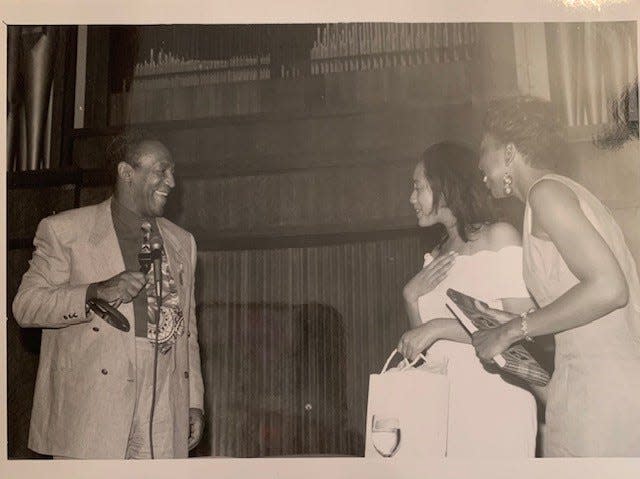Overturning Bill Cosby sex assault conviction is difficult to accept, but the right decision
- Oops!Something went wrong.Please try again later.
Whether you’re a survivor of sexual violence or not, the thought of a predator escaping justice is a bitter pill to swallow.
I met Bill Cosby at a function in college and, at first, I struggled viewing "America's Dad" as a predator. It is difficult when what we believe and what the law has decided has diverged.
While many are scratching their heads around the recent decision by the Pennsylvania Supreme Court to reverse Bill Cosby’s conviction, most people are looking at the decision through a lens that is different from the criminal justice lens.
Criminal justice is less about justice for victims than it is protection for the accused. The Constitution, particularly the Fifth and Sixth Amendments, is filled with protections for those accused of a crime – including the right to a public jury trial, to an attorney, to confront witnesses, an impartial jury and against self-incrimination. The idea of victim’s rights did not develop until much later through statutes. In the end, the person responsible for fighting for the victim is the prosecutor.

The recent decision by the Pennsylvania Supreme Court is an important reminder about the role and the importance of the prosecutor in this country. The American Bar Association states that the job of the prosecutor is actually "not merely to convict" but to see that justice is done. It is a noble profession, which comes with important responsibilities.
Even a bad deal is a deal
When I served as a prosecutor, one idea that was repeatedly emphasized was “word is bond.” Whether you made a great offer or a bad one, you had to stick to your word.
Even before the Pennsylvania Supreme Court decision, courts have recognized that with prosecutorial discretion comes immense power. For example, a police officer can use tricks to deceive during an investigation but if a prosecutor deceives, all can be lost. When prosecutors engage in plea bargaining with people accused of crime and their lawyers, the statements cannot be used against the accused. When one prosecutor makes a deal, even if it is a bad deal, it’s supposed to be honored. The prosecutor is important and the words of the prosecutor matter, whether those words are in writing or not.
Cosby’s release had nothing to do with any of the accusers in the case. Arguably, it was the courage of the accusers that led to the allegations being brought to light in the first place. Cosby’s conviction was overturned because of the actions of the prosecutor.
When allegations came out about Cosby, it appeared that there was no path to conviction due to the statute of limitations. Despite the dozens and dozens of accusers, the public is only aware of one accuser whose case came within the statute of limitations – and that case was no slam dunk.
USA TODAY's Suzette Hackney: Bill Cosby may be out of prison, but we know who he is – and it's not 'America's dad'
Cases involving sexual violence are always challenging to prosecute. Former prosecutor Bruce Castor made a deal. Cosby then made some shocking admissions during his deposition that he likely would not have made if it weren’t for the mutual understanding that his only exposure was a civil lawsuit. In other words, Cosby and his lawyers trusted the word of the prosecutor. The incriminating deposition was a “but for” result of the deal made with Castor. Using that deposition against Cosby at his trial was akin to tricking him into incriminating himself.
The court concluded this was unfair and a violation of Cosby’s due process. The court was right.
The power of the prosecutor

In its most basic sense, due process under the Fifth Amendment is about fundamental fairness. Castor’s decision to promise to not prosecute Cosby was a calculated move to get Cosby to participate in a deposition that would allow some of his accusers to sue Cosby civilly. Castor told his successor in writing that the deposition was off-limits as evidence in the criminal case because it only happened because of the deal he made. In spite of that, the deposition became a crucial piece of evidence that led to Cosby’s arrest and subsequent trials.
USA TODAY'S Opinion newsletter: Get the day's best insights in your inbox.
Cosby may have been convicted by the public, but under the law there is no conviction against him. Of course, that must feel like a slap in the face for everyone who shared their story of abuse. This chapter is likely over for him, though it will probably never be over for those who accused him. Understanding the court’s decision is not about dismissing the 79-page opinion as a technicality, nor is it about supporting victims of sexual violence. The true takeaway in this case is about the importance of understanding who prosecutors are and the power they possess.
Bill Cosby’s conviction was overturned because due process was violated when the prosecutor decided to ignore a promise. Upholding due process is not a technical aspect of the case but a crucial aspect of our criminal justice system.
Njeri Mathis Rutledge, a professor of law at South Texas College of Law Houston and a member of USA TODAY's Board of Contributors, is a former prosecuting attorney, a wife and a mother. She graduated from Spelman College and Harvard Law School. Follow her on Twitter: @NjeriRutledge
You can read diverse opinions from our Board of Contributors and other writers on the Opinion front page, on Twitter @usatodayopinion and in our daily Opinion newsletter. To respond to a column, submit a comment to letters@usatoday.com.
This article originally appeared on USA TODAY: Court was right to overturn Bill Cosby sexual assault conviction

